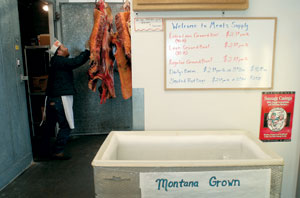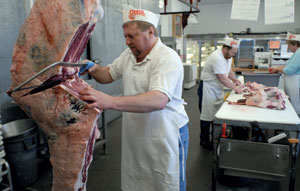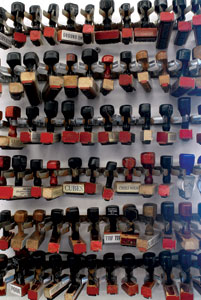The U.S. Food and Drug Administration recently deemed cloned meat to be as safe to eat as meat from traditionally bred livestock, but it still looks to be a tough sell in Montana, with a state representative already planning legislation opposing it, insiders in the meat industry expressing skepticism and a public that remains wary.
To be sure, livestock cloning has its share of proponents in the state, and elsewhere throughout the nation. Included among them are officials from the Montana Stockgrowers Association and a cross-section of ranchers, though not all support it.
To skeptics, however, the FDA’s decision is unfavorable for different reasons. Some say it came too soon. Others have moral and ethical qualms. And still others just don’t know what to think about it – they feel we’ve stepped into strange futuristic territory, which can be unnerving.
“Not a lot of ranchers are huge Star Trek fans,” said Jeremy Seidlitz, executive director of the state’s Cattlemen’s Association. “It’s an interesting, philosophical discussion.”
 |
|
Ryan Loveless guides locally raised buffalo quarters into a large freezer at Meats Supply, Inc. |
Seidlitz added that he and ranchers he has spoken with across the state are worried the decision came before the livestock industry and the public were ready. Ranchers, who Seidlitz calls “amateur geneticists,” have spent years specializing and diversifying livestock gene pools.
“It’s a little premature,” Seidlitz said of the decision. “Do we know what’s going to happen 40 years down the road?”
In 2001, U.S. producers agreed not to introduce meat or milk from clones or their offspring into the food supply until the FDA studied the issue more. Since then, the FDA has conducted numerous scientific studies and gathered public input to arrive at its Jan. 15 formal announcement that meat and milk from the clones of cattle, swine and goats, and from their offspring, are no different than conventional milk and meat.
In cloning, the nucleus of a donor egg is removed and replaced with DNA of a selected animal, most likely a prized animal. A tiny electric shock then stimulates the egg to grow into an exact duplicate of the original animal. It involves no genetic engineering.
 |
|
Jay Cameron, left, butchers a hindquarter while Ryan Loveless, center, trims beef pieces and Julie Komenda packages ground beef at Meats Supply, Inc., west of Kalispell. |
For Larry Coleman of Charlo, the only verified rancher in Montana to have already used cloning, the decision is long overdue. Coleman owns three clones from his prized bull First Down, which ruptured its urethra in 1996 and could no longer reproduce. That was the same year that Dolly, the famous sheep, was cloned. Coleman said he would have never considered cloning if First Down had not been injured.
Coleman’s bulls were cloned in 2002, giving him another First Down, Second Down and Third Down. The original First Down is now deceased. Coleman points out that a clone is an exact duplicate copy of another bull and poses no health threat, a position backed by the FDA’s decision.
“If people are scared about health, they should go back and look at the original,” Coleman said.
The FDA has asked producers to keep meat from cloned animals out of the food supply for now, but the meat from clones’ progeny – or offspring – can enter the market. It is unlikely that clones’ meat would enter the market anyway, as clones are used for breeding, not food. With the decision, breeders will now be more willing to buy semen from Coleman’s cloned bulls, opening up the doors for a market consisting of meat from cloned animals’ progeny.
“It’s a big decision and it’s here now,” Coleman said. “We were waiting for it for several years and we never thought it would take this long.”
Rep. Mike Jopek, D-Whitefish, fears the decision is a big step in the wrong direction for the food industry. Jopek, an organic farmer, introduced a bill at the 2007 Legislature that would have placed a moratorium on dairy products from cloned animals and meat from the offspring of clones. The bill failed because of what he called heavy pressure from corporate food lobbyists. Jopek said the main beneficiaries and proponents of cloned meat in the mainstream food supply are large corporations as opposed to local farmers and ranchers.
He plans to introduce legislation in 2009 that would require labeling to differentiate between cloned and traditionally bred products. The FDA decision calls for no such distinction.
 |
|
A large selection of stamps used to mark different kinds and cuts of meat hang on the wall at Meats Supply, Inc., west of Kailispell. |
“People come from all over the world to get a piece of Montana’s Black Angus gene pool,” Jopek said. “Why would you want to mess around with that just to benefit a few multi-national corporations at the detriment of family farmers?”
Jopek added, “If allowed into the marketplace it will escalate very, very quickly and will destroy the gene pool diversity that protects us from swings in the market and disease.”
Errol Rice, executive vice president of the Montana Stockgrowers Association, views the decision as progress. He points out that at the current cost – Coleman spent $20,000 on each of his clones – many ranchers wouldn’t consider cloning even if they wanted to. But for ranchers who want to duplicate a prized animal, or who have livestock unable to reproduce like in Coleman’s case, having the cloning option is important. In theory, all steaks in all corners of the U.S. could be the same high quality.
“Technology allows us to take the best traits from the best of our producing animals and try to replicate them,” Rice said. “Ranchers aren’t going to have their own labs on their ranches, growing calves from Petri dishes. As the ranch is concerned, everything is still going to be the same.”
Rice is quick to remind that the FDA decision is based on pure scientific findings. Ethical questions, which he says surely have their place, form a “debate for another time.”
“Some people get the notion that we’re all of a sudden going to be creating that novel, the ‘Brave New World,’” Rice said. “They’re essentially a twin; they’re not this super-clone freak.”
Here in the Flathead, people in the meat industry are skeptical. Wes Plummer, owner of Lower Valley Meat Processing, said he doesn’t think the public is ready to embrace cloned products. Larry Hadley, owner of Meats Supply, Inc., said the cloned beef will hit the big chain stores first and then if it does reach the smaller markets, he doesn’t expect his customer base to be asking for it. Meats Supply specializes in local hormone-free beef and Hadley plans to keep it that way.
“We’ve had good cattle that’s been proven for years and years – there’s no reason to change,” Hadley said. “I hope it doesn’t show up in our local market.”